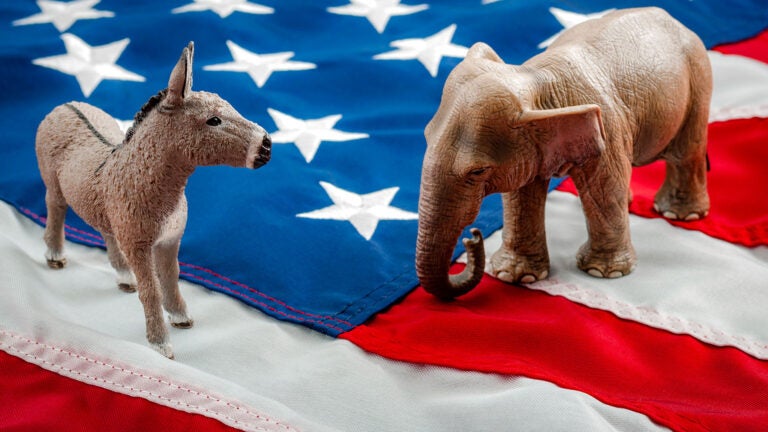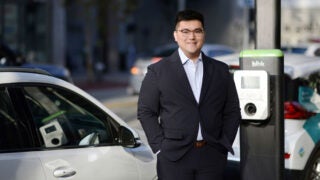
Democratic and Republican conventions have changed significantly amid the pandemic. (Photo/iStock)
Political conventions take an unconventional turn thanks to COVID-19
What will the Democratic and Republican national conventions look like during a pandemic? USC experts predict how each party — and the voters — will proceed.
Americans may be more politically polarized than ever, but if there’s one thing Democrats, Republicans and people of all political stripes agree on, it’s that the COVID-19 pandemic has fundamentally disrupted the 2020 presidential election.
Campaign rallies, fundraising events and door-knocking by volunteers became potential super-spreader events to be avoided at all costs. Some states delayed their primary elections, while others had to swiftly pivot to count the influx of vote-by-mail ballots.
Now that the primaries have concluded and the presumptive nominees — President Donald Trump and former Vice President Joe Biden — are clear, the general election season kicks off with back-to-back political conventions in August. Up first is the Democratic National Convention from Aug. 17-20, followed by the Republican National Convention, which begins on Aug. 24.
Both conventions have gone through multiple changes in date, venue and lineup amid the COVID-19 pandemic. Biden will accept the nomination from his home state of Delaware instead of Milwaukee, the original host city for what has become an almost strictly virtual convention. Trump will be renominated at a small event in Charlotte, N.C., and has suggested that he will accept during one of his signature rallies attended by supporters in or near Washington, D.C. There could still be some surprises in store, say USC political experts.
The importance of in-person contact
“Without a doubt, the two political conventions are going to be weird,” said Christina Bellantoni, a professor of professional practice at the USC Annenberg School for Communication and Journalism and director of USC Annenberg’s Media Center.
“These are events designed around in-person contact. A friendship forged in the hallways could lead to amassing presidential power decades later. Deals are sealed. Young party faithful start to prove themselves as they attempt to move up the ranks,” she explained. “The pandemic wiped that away.”
Conventions are produced with only one audience in mind: voters on their couch.
Christina Bellantoni
As a journalist who’s covered four presidential campaigns, Bellantoni is aware that the convention planners have more than party building in mind. What she predicts won’t change — and may even be enhanced by more careful attention to the virtual program — is the focus on the viewers.
“Conventions are produced with only one audience in mind: voters on their couch,” she said. “Those voters do watch, and they do listen to promises made and policies outlined. I’m sure both sides will be able to deliver what they think their voters want to hear, and the production quality won’t diminish, even if a lack of applause will seem eerie.”
Conventions during COVID-19: unpredictable and unprecedented
“The most predictable thing about these unprecedented conventions is that their impact is unpredictable,” said Robert Shrum, director of the Center for the Political Future at the USC Dornsife College of Letters, Arts and Sciences and a former political strategist and consultant.
“How big will the audiences be? How much will acceptance speeches — which, at least in Biden’s case, will not be a collection of applause lines but more like an Oval Office address — move voters? Will Trump cobble together an unmasked cheering section on the White House lawn or at Gettysburg, and in the year of COVID, will that backfire?”
Despite all the uncertainty, the veteran political strategist had a few predictions: “The Democrats will hold a virtual convention that will signal the kind of party unity that eluded Hillary Clinton in 2016. The Republican convention will be angrily negative. The Democrats will confront Trump, but their convention will also aim to be aspirational and uplifting.”
He also opined on the presumptive vice presidential nominees: “Sen. Kamala Harris is a historic choice who is charismatic and likely to shine. Mike Pence will be a sideshow.”
2020 will be a tale of two conventions
“After nearly 40 years, COVID-19 may achieve what no media executive could manage: eliminating the convention spectacle from our national televisions in favor of opt-in personal consumption of politics,” said Dora Kingsley Vertenten, a professor at the USC Price School of Public Policy.
“Trends in digital engagement and targeted social media messaging are fueling the 2020 election,” she explained. “Joe Biden and Kamala Harris’ #KHive campaign understand these forces and are planning bite-sized convention speeches and activities for audiences now experienced in Zoom calls on their laptops, iPads and phones.”
Trends in digital engagement and targeted social media messaging are fueling the 2020 election.
Dora Kingsley Vertenten
While other political experts have described missed opportunities for delegates to connect with each other and engage in party building, Vertenten sees a silver lining in the opportunity for the campaigns to project an image of party unity.
“Without a Milwaukee coronation convention — and the liability of too many parties and not enough message discipline — the DNC and the Biden-Harris campaign will deliver clear sound bites and edited campaign video with an eye toward digital replays on social media,” she predicted.
In contrast, she believes that Trump’s desire to speak before a live audience of convention delegates, using his signature rally style, could backfire.
“By hosting an in-person event, the GOP’s convention will seem quaintly old-fashioned to millennials and Gen Z voters, a critical voting bloc this year,” she said.
“The event will also concern older voters tuning in to see each balloon drop and confetti blizzard as a potential for spreading the virus. Voters who support Trump’s policies and achievements may reconsider their support for a reality TV show past its prime — one that should be canceled in favor of a TikTok video.”
Will COVID-19 remove the circus from the conventions?
“Conventions can be circuses — that’s partly what they are meant for — though they are circuses with very serious obligations to the party and the populace,” said William Deverell, a USC Dornsife history professor and the director of the Huntington-USC Institute on California and the West.
“A virtual convention is a tough hill to climb in terms of lighting people up about the candidate and the party’s stance on issues,” he said. In place of that, he expects to see a lot of real-time digital outreach to voters while the convention is happening: “Call this number, go to this website, send an email or text here or there.”
Circus or not, Deverell had one more prediction about both conventions:
“I expect that, given the turmoil of our times, there will be a somber tone running through the whole thing, a seriousness of purpose and moment that will likely be inescapable.”



